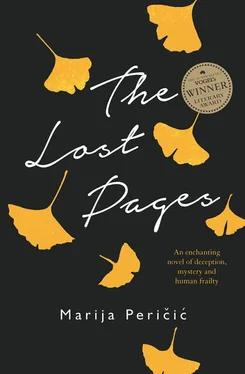I should have been relieved that the meeting I had dreaded was not to take place that evening, but in fact I felt worse. Franz’s shunning of the party was as incomprehensible to me as it seemed to be to Theodor, and fed into my raging jealousy. I imagined Franz sitting high above me like some king, lofty and unconcerned, as he was courted from all sides, while I, below him, toiled along in the dusty wastes, labouring over every line, craving acknowledgment.
Standing alone in the crowd made me feel vulnerable to a renewed offensive from Uta; she was sure to be watching me from some hidden vantage point. I remembered Fräulein Železný, and looked around, but I am not a tall man and was rewarded only with maddening glimpses of slim arms or knots of dark hair. I noticed my legs beginning to ache again from the prolonged standing and considered leaving, but at that moment a movement in the crowd gave me a clear glimpse of Fräulein Železný: she was standing at one of the windows, looking out. She was as brightly lit as though she were on a stage, [3] In the space below the text there are several small pencil sketches of a woman’s head in profile.
but an instant later the bodies surged together again and she was lost from my view. I fixed on the direction of the windows and began to squeeze my way through, murmuring apologies as I pushed people aside with increasing urgency. It seemed to take hours to cross the room, and when I arrived at the window, instead of Fräulein Železný, I found only a little group of actors from the theatre, drunkenly toasting each other and spilling their schnapps on the floor. I saw the café doors swinging closed on the other side of the room as someone left the party. Was it Fräulein Železný? I felt sure it had been. The room seemed dulled and flattened somehow with her absence, as though someone had turned off a bright light, and people’s voices now seemed shrill and echoing.
I stood with my back against the wall, watching the undulating crowd, their heads and mouths animated in conversation, and hands lifting and lowering glasses to their mouths. I could see no one who I knew. I felt completely drained of energy. My legs and the right side of my body now radiated with a pain that would not be ignored. I quietly collected my coat and left, without bothering to take my leave of anyone.
Outside the damp air of the river blew in my face and a dirty fog had rolled in. The Franzensbrücke rose up indistinctly, like a fairy-tale bridge that would melt under your feet when you tried to cross it, and its lamps hung like tired moons. I walked slowly up Postgasse, steadying myself against the walls as I went.
My body was tight with anxiety on the walk home and my mind ran over and over the problem of Franz. Although Franz and Theodor had not met, and thus I should be glad, I was not. I saw that the encounter between the two men had merely been delayed, pulled out into the future, where it lay in wait for me once more.
Where could he have been that night? If I were him, I would certainly have wanted to celebrate my first publication, to bask in the attentions of Theodor and the others at the party. I remembered Franz’s insistence when he had thrust those stories upon me all those months ago; surely this slow unfurling of recognition was what he had been aiming for? It was both puzzling and rankling. I could still see the look of naked longing on Theodor’s face as he scanned the room for Franz; he had certainly never looked for me in that way, even in the beginning—not that I had ever given him the opportunity to seek me out. I had always been the more eager one, the one doing the chasing. Franz’s absence began to seem like a personal insult to my own fierce ambition.
By now I had arrived home. Everyone was asleep. Even Elsa, the housemaid, had retired for the night, and the only sound was the uneven ticking of the loud clock that stood in the parlour. I creaked my way slowly up the stairs to my bedroom. As soon as I opened the door, my eyes fell on a glowing white object that lay in the middle of the floor. Without even turning on the lamp, I could see that it was a parcel, and when I picked it up I saw that it was from Franz. It was a thick bundle of papers—more stories—and the letter enclosed made no mention of the party he had missed. Why he would bother to send these stories to me after my lack of response to the previous ones was a mystery. Why court me at all when he had no difficulty getting published without my assistance? It was nonsensical. It seemed almost threatening. His persistence made me wary, but, contrary to my instinct to run, I decided that befriending him might be the best course of action.
SEEING THEODOR AT THE PARTY HAD MADE ME ANXIOUS [4] This word is unclear: it has been crossed out and written over.
TO continue again with my own writing, which I had neglected for some weeks. At that time I had put down some ideas that I had thought were quite promising, and had filled several notebooks with pages of notes and plans, but I was still having difficulty fitting everything together. My first book had been a work of fiction of the most conventional sort, but I had, in the interim, written some essays on different philosophical subjects, particularly on Schopenhauer, and I wanted my second work to be a grand avant-garde novel that would blend philosophy and fiction into a totally new form. I was especially interested in Schopenhauer’s ideas of representation and reality, and felt that incorporating these into the inner life of a fictional character was the perfect way to examine them.
But no—when I read back over the paragraph I have just written I realise that it is misleading. It is true that my first novel was conventional, and it is true that I had grand ideas about Schopenhauer and fiction, and had been excited and interested in the idea for this second novel, but the fact was that I had by this time become bored; bored and also desperate. The success of my first novel, Schloß Nornepygge , had completely transformed my existence; I could almost say that I had barely been alive before it, when I was only Max Brod: postal official. And, as Theodor was constantly reminding me, my name as a novelist was slowly fading, by the day, by the minute, and I dreaded being relegated to obscurity as one dreads poverty or illness.
When I returned home from work the day after the party, I told Elsa that I was not to be disturbed and locked myself in my study. I am a habitual worker when it comes to writing and most of my work has been completed in that study, at the old writing table that had been my grandfather’s. The table was of such a size that it seemed to possess a personality of its own, like a large and docile animal crouched in the centre of the room, waiting for me to arrive. I occasionally felt the urge to pat its leather top as one would pat a faithful old horse or dog.
I sat down and took out my notes, hopeful and ready to begin. But when I looked at them I found that what had seemed a few weeks ago to be coherent and promising plans were now nothing but pages of vague scribblings of unconnected ideas. I could no longer trace my old thoughts, and the threads that had seemed so clear to me earlier now wandered directionless and I could not follow their logic. Even my own handwriting was suddenly difficult to decipher. I tried to focus. I sat up straight in my chair and grasped the pages firmly. I bent my head over my notes and forced myself to read again from the beginning, but my mind kept switching off, and soon I was staring at the paper without seeing the words upon it.
My gaze drifted to the wall in front of me, my mind as blank as if it were sedated. I took in the minute details of the wallpaper’s topography. My eyes, outside of my control, travelled up and down the light stripes of the wallpaper’s design, shifting them in and out of focus. I became aware of the tick of the clock in the parlour, which slowly grew louder and then became syncopated with the scrabble and gnaw of some insect’s jaws at work on the inner beams of the house.
Читать дальше












